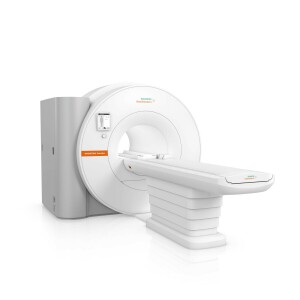by
John R. Fischer, Senior Reporter | November 17, 2021

Siemens has installed the first MAGNETOM Free.Max MR scanner in the U.S. at the University of Michigan Health System
Siemens Healthineers has installed the first U.S.-based MAGNETOM Free.Max MR scanner at the University of Michigan Health System.
Cleared by the FDA this summer, the solution boasts a 0.55 T MR field and is capable of running on less than one liter of helium, which reduces infrastructure and life cycle costs. It also is equipped with deep learning technologies and advanced imaging processing and, at less than 3.5 tons, is the most lightweight, compact whole-body MR system ever developed by Siemens.
"With this acquisition of the MAGNETOM Free.Max, University of Michigan Health will collaborate with Siemens Healthineers to vigorously explore the broader capabilities of mid-field magnetic resonance imaging with advanced image acquisition and reconstruction technologies, with the ultimate goal of expanding access to MR," said Dr. Vikas Gulani, chair of the department of radiology at Michigan Medicine, in a statement.



Ad Statistics
Times Displayed: 2548
Times Visited: 12 Fast-moving cardiac structures have a big impact on imaging. Fujifilm’s SCENARIA View premium performance CT brings solutions to address motion in Coronary CTA while delivering unique dose saving and workflow increasing benefits.
MAGNETOM Free.Max utilizes Siemens’ Deep Resolve algorithms for targeted denoising and deep learning to enhance the resolution of images. It also comes with myExam Companion workflow, which leverages AI to help users of all experience levels, regardless of the patient or throughput.
Additionally, the solution is the first and only 80 cm wide-bore system available and can be used to scan extremely obese and claustrophobic patients. At less than 80 inches high, the system’s reduced size allows it to be installed in places where MR has not been accessible in the past, with minimal structural modifications required.
The scanner is expected to increase MR utilization in orthopaedic centers, emergency rooms, outpatient centers and even intensive care units. It is also expected to be popular among radiology groups, physician groups, retail healthcare providers, as well as usable in urban and rural areas.
In addition to installing the system at the University of Michigan Health System, Siemens recently inked a deal to use MAGNETOM Free.Max to help
build the first carbon-neutral radiology imaging service at the University of California, San Francisco (UCSF).
Healthcare is estimated to be responsible for up to 5% of global net emissions, with imaging almost certainly contributing to an outsized share of that total. Through its collaboration with UCSF, Siemens will help make radiological imaging more eco-friendly as well as more accessible to residents in Northern California and produce better image quality.
MAGNETOM Free.Max is viewed as greener, lighter and smaller and will be used to study how Siemens’ scanning technology can be used for eco-friendly imaging. The two will also utilize Siemens’ Smart infrastructure solutions to monitor power consumption of radiology equipment at UCSF and study how to reduce standby energy consumption in MR scanners. The reduced power consumption will allow the university to use renewable energy certificates to establish a carbon-neutral imaging fleet.
"Green radiology will offer patients the opportunity to participate by choosing imaging resources that lower carbon emissions. We expect that in the years to come, considerations like this will have a larger role in the healthcare choices that patients make," Dr. Christopher Hess, professor and chair of the UCSF department of radiology and biomedical imaging, told HCB News.
The University of Michigan Health System was unable to respond to HCB News for comment.


Zac Kollegger
Interesting
November 18, 2021 02:46
I was under the impression the first one in the US was installed by Zwanger Pesiri Radiology on Long Island, NY
to rate and post a comment